| Srl | Item |
| 1 |
ID:
131979
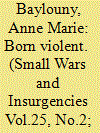

|
|
|
|
|
| Publication |
2014.
|
| Summary/Abstract |
We know little of the internal governing practices of non-state actors once in control of territory. Some territories have witnessed the establishment of new institutions of public goods remarkably similar to state institutions. This article compares four armed political parties governing territory during the Lebanese civil war. These non-state violent actors established complex political and economic institutions and administrative structures. Despite the wide range of ideologies and identities of these actors, they all converged in their institutional priorities, although not in their capacities or the particular ways of achieving those priorities. Data from interviews and the actions of the armed political parties suggest a combination of ideology and desire for control is causal in generating public institutions, partly attributable to the high degree of citizen activism marking the Lebanese case.
|
|
|
|
|
|
|
|
|
|
|
|
|
|
|
|
| 2 |
ID:
164592
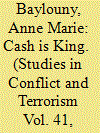

|
|
|
|
|
| Summary/Abstract |
The role of resources in war has been much debated. What happens when foreign patrons provide lavish amounts of cash to rebels, without mechanisms of accountability? This article analyzes three major sources of funding and their micro-level effects on insurgent-groups in the Syrian civil war. Recipients of funding demonstrated opportunism in actions, alliances, and ideologies, directly related to the funding source. Funders thus set the agenda of the war, promoting Islamist ideologies and regional over local issues. Private donors rivaled state sponsors, in what may be a harbinger of future globalization trends.
|
|
|
|
|
|
|
|
|
|
|
|
|
|
|
|
| 3 |
ID:
091506
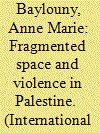

|
|
|
|
|
| Publication |
2009.
|
| Summary/Abstract |
The importance of space in diverse forms of mobilization is increasingly recognized. In the Palestinian West Bank, the rising number of borders has decreased mobility and limited individuals to small local spaces, generating new patterns of collective action and identity where national-oriented organizing had been strong.
|
|
|
|
|
|
|
|
|
|
|
|
|
|
|
|
| 4 |
ID:
081985
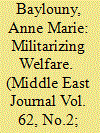

|
|
|
|
|
| Publication |
2008.
|
| Summary/Abstract |
Jordan's seemingly successful economic and political reforms have been used to advertise the American vision of societal transformation in the Middle East. The imposition of neo-liberal economic policies removed a key source of welfare for the populace, leaving the regime without a secure base of support. Economic liberalization led to a radical change in the regime's base of support, marginalizing the previous regime backers - the East Bank population - and replacing them with a strengthened military, formerly only part of the regime's support. Initial economic liberalization was a critical juncture when differing outcomes were possible. The 1990s set the institutions and state policies that persisted after these extreme hard times passed. An analytical focus on state social provisioning demonstrates the changed social base of the Jordanian regime and the groups effectively disenfranchised by the new arrangements. The military and security services are the only sector growing in structural adjustment. Alongside decreasing social welfare allocations in general, the military's budgets are increasing and the military diversifying into sub-contracting and new economic enterprises. Militarized liberalization serves as an alternative model for Middle East regimes, one that can furnish the foundation for semi-authoritarianism into the near future. This changing social base of the regime, illuminated through an examination of social welfare, must be recognized when tackling the perennial question of a democratic deficit in the Middle East
|
|
|
|
|
|
|
|
|
|
|
|
|
|
|
|
| 5 |
ID:
159596
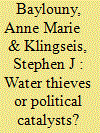

|
|
|